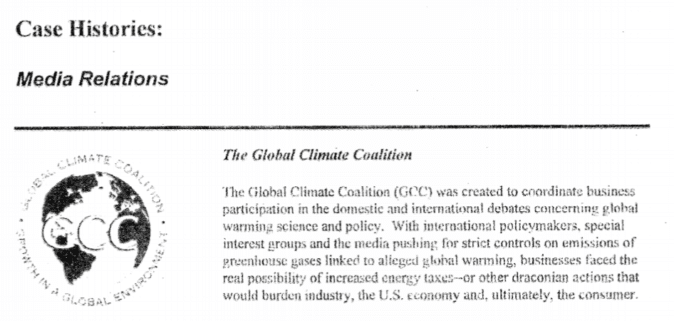A new paper by Robert Brulle in the journal Environmental Politics introduces several new documents to the ClimateFiles GCC collection, including important internal documents from the Global Climate Coalition and National Association of Manufacturers.
Link to the full paper:
Advocating inaction: a historical analysis of the Global Climate Coalition
ABSTRACT
Ever since climate change became a political issue in the late 1980s, a number of industry coalitions have formed to oppose mandatory carbon emissions reductions. One key coalition was the Global Climate Coalition (GCC). This paper conducts a historical and empirical review of the activities of this coalition. This review shows that the GCC engaged in four distinct activities to obstruct climate action: 1) monitoring and contesting climate science, 2) commissioning and utilizing economic studies to amplify and legitimate their arguments, 3) shifting the cultural understanding of climate change through public relations campaigns and 4) conducting aggressive lobbying of political elites. Through these activities, the GCC played an important role in obstructing climate action, both in the U.S. and internationally. Further analysis of similar coalitions can aid in our understanding of the organized opposition to climate action.
The new documents:
One pager from E. Bruce Harrison’s PR company
This document, which appears to have been written in 1994 or 1995, is a summary of the campaign E. Bruce Harrison and his PR company ran the Global Climate Coalition. This document is stunning as it lays out the internal objectives of the GCC, the strategies and techniques deployed and the results they felt they had achieved. It confirms many things we knew and opens dozens of new questions about the extent of the GCC’s influence peddling campaign. The full text is below the link to the scanned document.
Full text of the above document:
Case Histories
Media Relations
The Global Climate Coalition
The Global Climate Coalition (GCC) was created to coordinate business participation in the domestic and international debates concerning global warming science and policy. With international policymakers, special interest groups and the media pushing for strict controls on emissions of greenhouse gases linked to alleged global warming, businesses faced the real possibility of increased energy taxes – or other draconian actions that would burden industry, the U.S. economy and, ultimately, the consumer.
Harrison designed and implemented a media relations effort to communicate two key messages: First, that scientific evidence for global warming is not strong enough to warrant drastic actions; and second, that regardless of science, actions must be evaluated in terms of potential economic costs.
Harrison delivered these messages through an aggressive campaign which included responding quickly to press coverage and any key policy decisions or announcements, media tours for GCC officials and third-party experts, editorial board visits, op-eds by scientists and economists, briefings for key environmental reporters, press releases, a monthly newsletter, and exposure at key media conferences such as the Radio and Television News Directors Association conference.
Results:
GCC has successfully turned the tide on press coverage of global climate chance science, effectively countering the eco-catastrophe message and asserting the lack of scientific consensus on global warming.
GCC actively influenced the debate over carbon taxes during the budget deliberation in Congress, emphasizing potential economic damages. Strict energy taxes were left out of the final agreement.
GCC’s efforts to raise awareness of the science and economics of climate change influenced the administration’s decision to rely on voluntary (rather than mandatory) measures to reduce greenhouse gas emission in its Climate Change Action Plan.
GCC has responded to every major domestic and international policy announcement and new scientific finding regarding climate change, often generating press coverage or getting GCC’s viewpoint included in national news stories.
An internal Global Climate Coalition “Communications Program” report, prepared for GCC Board, July 11, 1995:
This document is also amazing, shedding new light on the budgets and objectives of the GCC’s Communications Program in a crucial period in the early 1990s.


